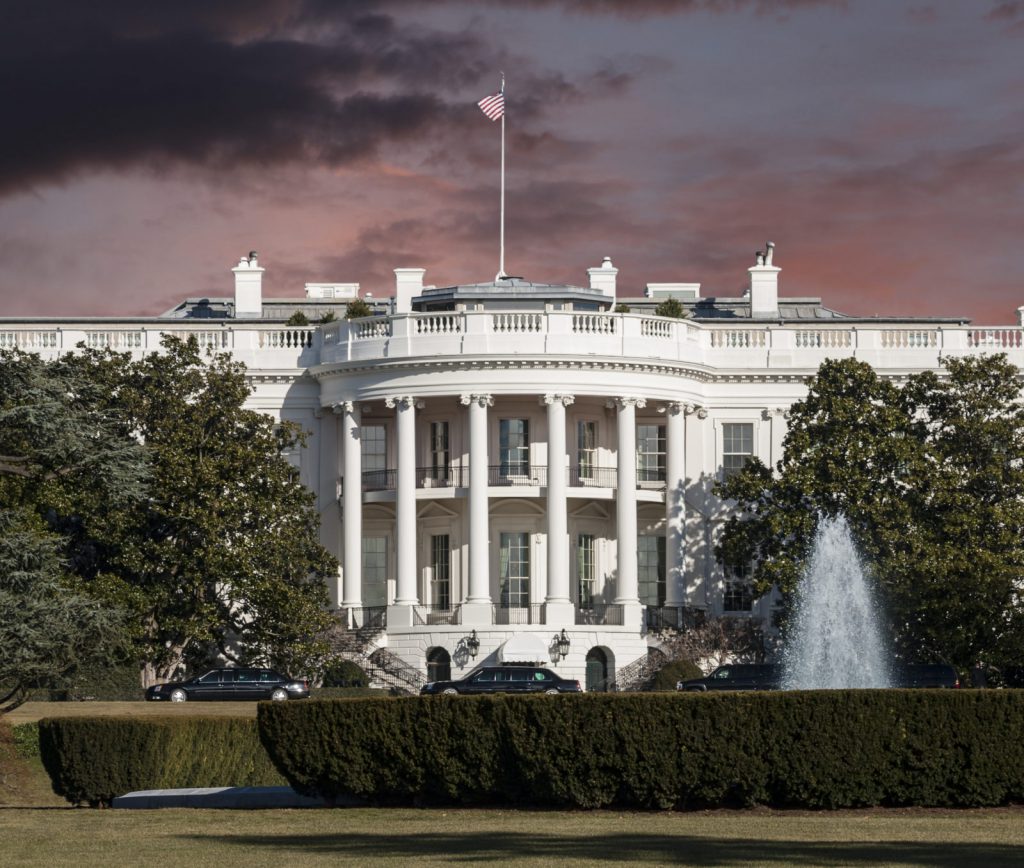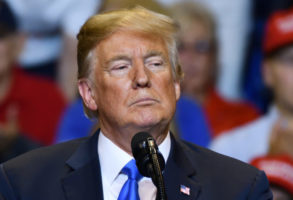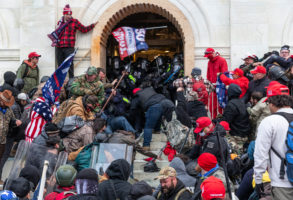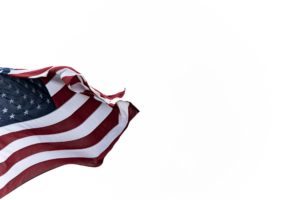
Published January 25, 2018
The Weekly Standard - January 29, 2018 issue
Review: How Democracies Die, by Steven Levitsky and Daniel Ziblatt
We are living in an era of political panic. Some of President Donald Trump’s most enthusiastic supporters in 2016 were motivated to overlook his shortcomings by desperate fear that our system of government was near death and only the most extreme measures could save it. A poll conducted by PRRI and the Atlantic immediately after the election found that more than 60 percent of Trump’s voters believed the 2016 election was “the last chance to stop America’s decline.” As one pro-Trump essayist famously put it, things had gotten so bad that it was time either to “charge the cockpit or you die.”
Since the election, similar fears of impending doom for our republic have overwhelmed some critics of Trump. They say that Trump is an autocrat in the making, intent on crushing dissent, repressing the free press, quashing congressional oversight, delegitimizing the courts, and ultimately killing our democracy. Even when they are not put so starkly, implicit fears of such looming autocracy color much of the resistance to Trump.
And the president has surely stoked these worries. He fired the director of the FBI while the agency was investigating his own campaign. He seems to view the other branches of government as wayward employees more than coequal partners. He often chafes against the restraints on policymaking. He routinely derides key institutions in ways that cannot help but undermine their legitimacy. He said the political press is “the enemy of the American people.” He has expressed admiration for foreign strongmen.
If these assorted measures and statements cohered around some consistent ethic of action, they might well add up to a powerful case for concern about an overthrow of our Constitution. But since they are a few among the vast and jumbled swarm of presidential words and actions, concerns that Trump is aiming at despotism have tended to be rather loose and vague—more a mood than an indictment. Is there more to them than yet another 21st-century expression of a nebulous, apocalyptic dread?
In their new book, How Democracies Die, Harvard’s Steven Levitsky and Daniel Ziblatt do us the enormous favor of not only carefully cataloguing these concerns but also considering them in the context of historical examples of democracies undone into autocracies around the world. The result is powerfully clarifying. But what it clarifies is that fears that Trump will be an autocrat are overblown and are the wrong kinds of concerns to have about his very disconcerting presidency.
Levitsky and Ziblatt are both noted political scientists and experts in how states fail. Levitsky’s work has focused on Latin America, and Ziblatt has studied modern Europe. This allows them to offer a depth of expertise in how strongmen come to power that enriches and enlivens this ably written book. Each of its first few chapters begins with a dramatic story of democracy in collapse—Chile in the 1970s, Italy in the 1920s and ’30s, the Hugo Chávez nightmare, Hitler’s rise to power, Erdogan’s descent into despotism, and more. Each story is told with flair and an attentiveness to key particulars, and each is carefully folded into a persuasive typology of democratic decline.
But then, in the book’s later chapters, the authors turn their attention to American politics, and their careful work comes undone. The very strength of the book’s opening section, its clarity about the nature of autocracy, renders ridiculous the attempt to cast contemporary American political developments in the same light.
Levitsky and Ziblatt contend, for instance, in opening the book’s eighth chapter, that “Donald Trump’s first year in office followed a familiar script. Like Alberto Fujimori, Hugo Chávez, and Recep Tayyip Erdogan, America’s new president began his tenure by launching blistering attacks on his opponents.” Any reader who did not arrive fully pre-sold on the proposition that Trump is an autocrat must respond to this comparison with rolling eyes.
At first glance this tendency to facile analogy might be deemed a symptom of the sort of Trump derangement that (in positive or negative forms) has come to afflict pretty much all of us who follow politics in America. But Levitsky and Ziblatt advance a case with roots in a different—if no less familiar—excess. In their assessment of American politics, they turn out to be fairly standard Democratic partisans, with the various fixations and blind spots customarily associated with that breed.
Their story of how our politics began its trek toward autocracy follows the partisan narrative laid out in recent years by a number of liberal journalists and academics. It begins, ominously, in the early 1980s when a young Republican congressman named Newt Gingrich decided to overthrow the previously polite and bipartisan culture of Washington in favor of an entirely new kind of cutthroat, take-no-hostages politics.
Levitsky and Ziblatt quote, as a statement of fact, former Democratic congressman Barney Frank’s assertion that Gingrich “transformed American politics from one in which people presume the good will of their opponents, even as they disagreed, into one in which people treated the people with whom they disagreed as bad and immoral.”
Their insistence that under Gingrich’s speakership and afterward, “the GOP adopted a ‘no compromise’ approach” essentially ignores all the major legislation of the mid- and late-1990s. Their assertion that George W. Bush willfully spurned bipartisan cooperation ignores most of the legislation passed in Bush’s first term. They simply blame the Republican Congress for the intense partisanship of the Obama years.
The problem is certainly not just Trump, then, but a long process of corrosion of cooperative norms, for which they argue Republicans are fundamentally to blame. This portion of their argument turns out to be yet another liberal lament for America’s midcentury elite consensus. They describe a process of declining faith in elite institutions but assign no fault to the country’s elites except maybe for the failures of Republican elites to stand in solidarity with Democratic ones on key issues.
When Levitsky and Ziblatt do cite a role for the Democrats in this gradual corrosion of democracy, it is generally with large caveats. Some of the Obama administration’s polarizing moves, like the anti-constitutional seizing of immigration policy from Congress, are justified as necessary given Republican intransigence. Others, like needlessly compelling Catholic nuns to pay for contraception, are simply never mentioned.
And more important, Levitsky and Ziblatt essentially ignore core conservative complaints about the ways in which the left has undermined our constitutional norms and institutions. The progressive celebration of executive unilateralism, of the administrative state, and of a politicized judicial branch are left unmentioned. But even though they do not amount to autocracy, of course, these long-term trends are surely threats to American democracy and of at least the magnitude of President Trump’s tweets.
And yet to say so, Levitsky and Ziblatt suggest, would itself amount to an attack on our institutions. Without a hint of irony, they note that one of the ways the Tea Party movement undermined political norms was that it lodged the accusation “that President Obama posed a threat to our democracy.” Later they say, regarding Republican critiques of Obama, that “such extremism encourages politicians to abandon forbearance. If Barack Obama is ‘a threat to the rule of law,’ as Senator Ted Cruz claimed, then it made sense to block his judicial appointments by any means necessary.” Presumably this means that if you write an entire book arguing that Donald Trump threatens to bring the death of democracy, you are similarly justifying resistance to his administration by any means necessary.
But ultimately, Levitsky and Ziblatt do stop short of quite that accusation against Trump. Their book does not deliver on its promise to demonstrate that Trump is a burgeoning autocrat, as they recognize toward the end. Their search for hard evidence turns up short.
“Perhaps the most antidemocratic initiative yet undertaken by the Trump administration,” they write in their final chapter, “is the creation of the Presidential Advisory Commission on Election Integrity”—a body Trump disbanded since their book was finalized. And there is not much more in terms of real proof of harm. “Overall, then,” they acknowledge, “President Trump repeatedly scraped up against the guardrails, like a reckless driver, but he did not break through them. Despite clear causes for concern, little actual backsliding occurred in 2017. We did not cross the line into authoritarianism.”
This seems quite right, and it is a valuable point to stress while raising other major concerns about Trump. But it would have been stronger if not for the 200 pages of reductio ad Hitlerum that precede it. And recognizing they have pulled the rug out from under their readers, Levitsky and Ziblatt recoil even from their own reticence to indict the president. “Comparing Trump’s first year in office to those of other would-be authoritarians,” they note in closing, “the picture is mixed.”
This is a cop-out and a missed opportunity. The fact is there is an enormous amount to worry about regarding Trump’s presidency, and a book by two such thoughtful political scientists might have helped to highlight some of those worries—about the crucial importance of character in leadership, the threat to the presidency from personal financial corruption, the danger of sowing division in an already fractured society, the risks to norms of administration and respect for institutions, the lack of basic competence and capacity, the implications of gross ineptitude, the cost of erratic leadership, the consequences of abject ignorance, and much more. But by opting for panic over worry, and so for the most extreme of possible complaints against Trump, Levitsky and Ziblatt have made it harder to take seriously what is genuinely worrisome about him.
They call our attention to assorted warning signs of brewing despotism in foreign autocracies, then stretch hard to draw analogies to Trump’s assorted misdeeds. But at the core of each of their stories of democracy undone abroad is a focused, ambitious, ruthless leader intent on seizing control. There is no such person at the core of the Trump presidency. The causes for worry before us are different. The president certainly lacks a moral compass, is blinded by mind-boggling narcissism, has a weak spot for despots, and is unfit for his job. But he is almost comically unfocused and pathetic. Does it make sense to call such an obviously weak leader a strongman?
The effects of Trump’s presidency on our system of government could well open a path toward the degradation of democracy in time, but that becomes harder, not easier, to see when we insist on comparing Trump to Mussolini. Maybe at some point Trump and his administration will actually move in an autocratic direction, but the best way to weaken the response of our political culture if that happens is to say it is already happening when it isn’t.
This inclination to panic rather than worry is by no means limited to the Trump resistance movement. It is pervasive in our polarized politics now. We seem unable to rouse ourselves to take problems seriously unless we can persuade ourselves that they present immediate and utterly cataclysmic dangers.
We cannot be concerned about the gradual effects of industrialization on the climate unless we convince ourselves that innocents will soon be drowning in the streets of the world’s coastal cities. We cannot worry about the implications of the federal budget deficit for future prosperity without insisting that we are at the very precipice of a Greek-style debt crisis that will make shirtless beggars of our children. And we apparently cannot worry that Donald Trump is unfit for his office in ways that over time could degrade our constitutional system unless that means he is about to destroy our democracy and trample our freedoms under steel-toed boots.
This inability to worry properly without panicking makes it much harder for our politics to take the future seriously, to consider tradeoffs, and to see the case for less-than-radical policy action. It therefore causes us to leave unaddressed the very problems we find so distressing—as the unreasonableness of the jeremiads that dominate our politics leaves the public skeptical of more modest concerns as well and makes plausible solutions look inadequate. Ironically, we end up not worrying enough, and our political and cultural elites in particular remain awfully smug amid their panic.
This rush to apocalyptic fears is largely a function of the passionate polarization of our politics. It is a way of sustaining partisan intensity and justifying the outrageous levels of mutual animosity required to keep all arguments—on cable news, on social media, and on the campaign trail—always at a fever pitch. All of us fall into it sometimes.
Such blinding polarization is itself another long-term challenge to our democracy—not something that will kill us tomorrow, but something we ought to worry about and work to mitigate where we can. Signs of its potential to distort our politics are everywhere. Unfortunately, Levitsky and Ziblatt’s book is one of them.
Yuval Levin is a contributing editor to THE WEEKLY STANDARD, Hertog fellow at the Ethics and Public Policy Center, and editor of National Affairs.








